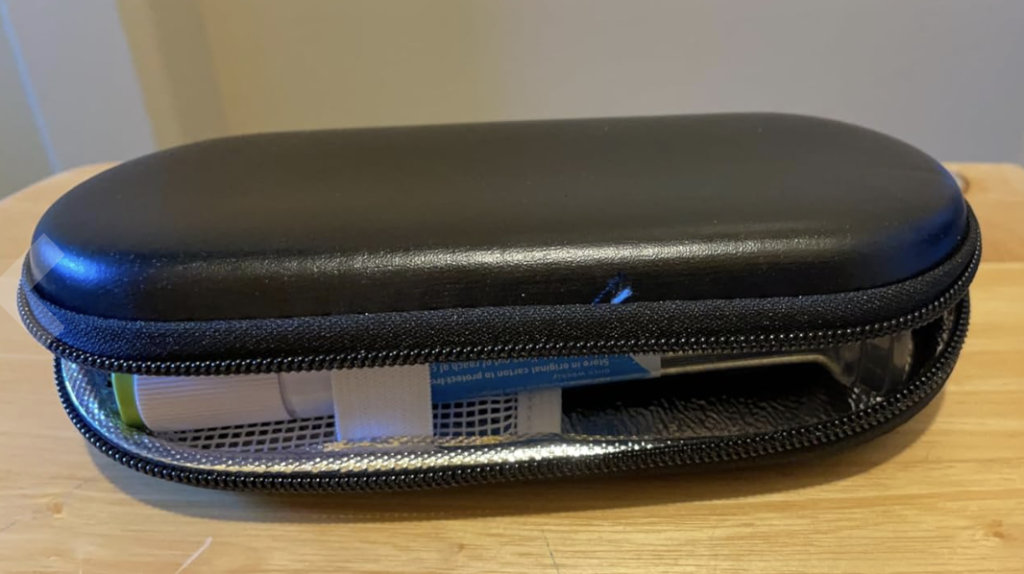As the medical industry evolves, so does the necessity for products that not only meet medical efficacy but also align with the dynamic lifestyles of those they serve. This guide delves into the heart of what makes an insulin cooler travel case not just functional, but exceptional. Whether you are a company looking to expand your product line with cutting-edge solutions, a healthcare provider seeking reliable recommendations for patients, or a procurement specialist aiming to enhance patient care, especially for those traveling, this guide offers valuable insights.
Optimal insulin cooler travel cases require precise temperature control, size flexibility, durable materials, and personalization options, ensuring safety, efficacy, and user convenience for diverse lifestyles and diabetes management needs.
Why Insulin Requires Special Travel Cases
Insulin Sensitivity to Environmental Conditions
The journey begins with understanding the critical role insulin plays in the lives of millions. Insulin, a hormone essential for regulating blood sugar levels, is a lifeline for those with diabetes. However, this lifesaver is incredibly sensitive to environmental conditions. When traveling, the lack of proper storage can lead to insulin degradation, rendering it less effective or even useless. This section explains the molecular structure of insulin and how it’s susceptible to denaturation when exposed to temperature variations, emphasizing the importance of maintaining its integrity for effective diabetes management.
How Temperature Affects Insulin Potency
Next, we delve into the crux of insulin’s vulnerability – its sensitivity to temperature. Insulin must be stored within a specific temperature range (typically between 2°C and 8°C for unopened vials and up to 30°C for opened ones) to maintain its efficacy. Exposing insulin to extreme temperatures – too hot or too cold – can lead to a loss of potency. This part of the article presents a detailed analysis of how temperature fluctuations impact insulin’s chemical structure and effectiveness. It also discusses the potential health risks associated with using compromised insulin, underlining the necessity of reliable cooler travel cases for preserving insulin quality.
Case Studies of Effective Insulin Coolers
In the realm of insulin cooler travel cases, the Gelozid Insulin Pen Cooler Travel Case stands out as an exemplary product, offering practical solutions to the challenges faced by diabetic travelers. This case is not just a mere accessory but a critical companion for maintaining insulin efficacy on the go. Here’s an in-depth look at its features and benefits:
1.Exceptional Insulation Performance: The core strength of the Gelozid case lies in its high-quality insulation. This feature is crucial for preserving the insulin’s effectiveness, especially in fluctuating external temperatures. The insulation ensures that the internal environment of the case remains stable, thus safeguarding the insulin from temperature-induced degradation. This level of temperature control is paramount for insulin-dependent individuals, particularly during long-haul travel or in regions with extreme weather conditions.
2.Innovative Cooling Elements: The inclusion of two reusable ice packs in the Gelozid case represents a significant advancement in portable insulin storage technology. These ice packs are designed to maintain a consistent cooling effect, a vital requirement for insulin preservation. This system provides a reliable and long-lasting cooling solution, essential for trips where conventional refrigeration might be unavailable.
3.Design and Portability: The Gelozid case is a model of convenience and functionality. Its compact size makes it an ideal travel companion, fitting easily into handbags, backpacks, or carry-on luggage. The sleek black design adds an element of style, making it a discreet yet fashionable option for travelers. This portability is particularly beneficial for active individuals or those who need to have their insulin accessible at all times.
4.User Experience and Satisfaction: Customer reviews and feedback have consistently highlighted the Gelozid case’s effectiveness and user-friendly design. Users have particularly appreciated its reliability in temperature control and the ease of carrying it around. Such positive user experiences underscore the case’s value in providing peace of mind and enhancing the quality of life for those who rely on insulin while traveling.
However, it’s important to note that the Gelozid case may not accommodate all types and sizes of insulin pens, indicating the need for potential buyers to verify compatibility with their specific insulin pen models.
The detailed examination of the Gelozid Insulin Pen Cooler Travel Case underscores its significance in the landscape of diabetic care products. It serves as an excellent example of how a well-designed product can profoundly impact the daily lives of those managing diabetes, particularly in the context of travel.

Essential Features of Insulin Cooler Travel Cases
Ensuring the safety and efficacy of insulin during travel hinges on several key customization requirements for insulin cooler travel cases. These aspects not only address the practical needs of insulin storage but also enhance user experience and compliance with health standards.
Critical Temperature Control and Monitoring in Insulin Cases
Maintaining Precise Temperature Ranges: The effectiveness of insulin is highly temperature-sensitive,necessitating storage within strict temperature parameters. For unopened vials, this is typically between 2°C and 8°C, and for opened vials, up to 30°C. Deviations can lead to insulin degradation, compromising its effectiveness and the safety of the user. Insulin cooler cases must be designed to consistently maintain these temperatures, regardless of external environmental conditions.
Advanced Solutions for Monitoring: Modern insulin cooler cases incorporate cutting-edge technologies for temperature monitoring. Features like integrated digital thermometers and smart sensors offer real-time temperature readings and alerts. This not only assures users of the ongoing safety of their insulin but also adds a layer of convenience and reassurance, especially during long trips or in areas with extreme temperature fluctuations.
Size and Portability in Insulin Travel Cases
Varied Sizes for Different Needs: Understanding that insulin storage needs vary from individual to individual,cooler cases come in different sizes. Smaller cases cater to day-to-day use, holding a single day’s supply, while larger options are designed for bulk storage or extended travel. This customization ensures that every user finds a case that fits their specific quantity requirements.
Ergonomic and Easy-to-Carry Designs: The portability of an insulin cooler case is key to its functionality. Designs that prioritize ease of transport – through lightweight materials, comfortable handles, compact shapes, and even options for discrete carrying – make these cases travel-friendly. This is crucial for individuals who need to keep their insulin accessible without it being a burden, whether they are commuting, traveling, or simply going about their daily activities.
Durability and Quality of Insulin Case Materials
Materials That Offer Strength and Insulation: The choice of material is critical in insulin cooler case design. Materials must offer dual benefits – durability to withstand the rigors of travel and effective insulation to maintain internal temperature. High-grade plastics, robust fabrics, and specialized insulating linings are often chosen for their ability to meet these requirements.
Impact on Insulation Efficiency: The quality of these materials directly affects the case’s thermal retention capabilities. Superior materials ensure better insulation, keeping the insulin at the required temperature for extended periods. This is essential not just for the preservation of the insulin but also for the peace of mind of the user, knowing their medication remains effective.
Personalized Options in Insulin Cooler Cases
Personalization for Style and Branding: Insulin cooler cases offer customization in design and aesthetics, allowing users to choose colors, patterns, or even incorporate personal or brand logos. This aspect of customization extends beyond functionality, catering to individual styles and preferences, and can be particularly appealing for brands looking to promote their identity.
Flexible Designs for Diverse Requirements: With modular designs and adjustable compartments, these cases can be adapted to suit various types of insulin storage – from pens to vials – as well as accompanying accessories like needles and glucose monitors. This flexibility is a significant advantage, allowing one case to meet a range of storage needs.
Safety and Compliance in Insulin Cooler Cases
Regulatory Compliance for Peace of Mind: Compliance with health and safety regulations is non-negotiable for insulin cooler cases. They must meet specific standards to ensure they are safe for medical use and travel. This includes materials being safe for contact with medications and the case being designed to adhere to airline regulations, ensuring hassle-free travel.
Focus on User Safety: The ultimate aim of these customization features is to ensure the safety of the insulin and, consequently, the user. A case that effectively balances temperature control, size, durability, personalization, and safety not only serves its practical purpose but also becomes an indispensable tool for anyone dependent on insulin.
In crafting insulin cooler travel cases, these key customization requirements – temperature control and monitoring, size and portability, durability and material quality, customization options, and adherence to safety and compliance standards – are essential. They ensure the cases not only keep insulin safe and effective but also align with the diverse lifestyles and needs of users, thereby providing invaluable support in managing diabetes on the move.
Insulin Cooler Case Market Trends and Consumer Choices
The landscape of medical travel accessories, particularly insulin cooler travel cases, is rapidly evolving, shaped by emerging market trends and consumer preferences. Understanding these dynamics is crucial for manufacturers and healthcare providers alike, as they offer invaluable insights into the future direction of product development and customization.
Latest Trends in Medical Travel Accessories
The Rise of Smart Technology: One of the most significant trends is the integration of smart technology into travel cases. Features like Bluetooth connectivity for temperature monitoring, alerts sent directly to smartphones, and data logging capabilities are becoming increasingly popular. These technological advancements cater to a growing demand for convenience and control, allowing users to manage their insulin with greater ease and confidence.
Sustainability and Eco-Friendly Materials: Another key trend is the growing emphasis on sustainability. Consumers are increasingly looking for products made with eco-friendly materials. This shift is driving innovation in materials used for insulin cooler cases, with a focus on biodegradable, recyclable, or sustainably sourced components. Such considerations not only appeal to environmentally conscious consumers but also align with broader global initiatives for environmental sustainability.
Influencing Insulin Case Design: Consumer Preferences
Customization and Personalization: Feedback from users indicates a strong preference for customization in both functionality and aesthetics. Consumers desire cases that not only meet their specific insulin storage needs but also reflect their personal style. This includes preferences for color, design, and size, as well as functional customizations like adjustable compartments or additional pockets for related diabetes care items.
Balance of Durability with Lightweight Design: Consumers are also expressing a need for a balance between durability and lightweight design. While the protection of the insulin is paramount, the ease of carrying the case for everyday use and travel is equally important. This preference is pushing manufacturers to innovate in design, using materials that offer robust protection without adding unnecessary weight.
Trends and Preferences Driving Customization in Insulin Cases
Tailoring Products to Meet Evolving Needs: The convergence of these market trends and consumer preferences is significantly shaping the customization needs in insulin cooler travel cases. Manufacturers are being prompted to create products that are not just functionally apt but also resonate with the evolving lifestyles and values of consumers. This includes smart cases for tech-savvy users, eco-friendly options for environmentally conscious individuals, and personalized designs for those seeking a unique product.
Informed Development and Enhanced User Experience: By staying attuned to these trends and preferences, manufacturers can develop products that not only meet the current market demand but also enhance the overall user experience. This approach leads to greater customer satisfaction and loyalty, and positions brands as leaders in the market who are responsive to consumer needs and global trends.
In summary, the market for insulin cooler travel cases is witnessing a dynamic shift, influenced by technological advancements, environmental considerations, and consumer desires for customization and practicality. These factors are not just influencing current market offerings but are also shaping the future of product design and development in this sector.
Successful Customization in Insulin Cooler Cases
Delving into the realm of insulin cooler travel cases, we find remarkable success stories that not only cater to specific needs but also set new standards in product design. By examining cases like the Olaismln and MOSLA Insulin Cooler Travel Cases, we can glean valuable lessons and best practices.
Olaismln Case: Compact and Efficient Insulin Storage
Innovative Design for Maximum Portability: The Olaismln case stands out for its compact size, making it an ideal choice for daily use and short trips. Designed to keep insulin pens and supplies cool for up to 12 hours, it includes two TSA-approved ice packs, ensuring compliance and convenience for air travel. Its small footprint exemplifies how design can meet the needs of users seeking a lightweight, easily portable option.
Valuable Lessons from User Feedback: Users praise the Olaismln case for its effective insulation and the added convenience of two ice packs. This positive response highlights the importance of a travel-friendly design in insulin storage solutions. However, a noted limitation is its size constraint, which may not accommodate all insulin pen types, underscoring the need for versatility in size options within the product range.

MOSLA Case: Durable Insulin Storage for Travel
Robust Build for Diverse Environments: The MOSLA case is tailored for users who require a sturdy solution for their insulin storage needs. It can keep insulin and diabetic supplies at the correct temperature for up to 8 hours, thanks to its two ice packs. The case’s durability, combined with its lightweight and compact design, makes it suitable for a variety of settings, from travel to outdoor activities.
Consumer-Centric Approach in Design: The case’s popularity stems from its focus on durability and organization. It features a robust zipper and well-designed compartments, making it easy to organize and access diabetic supplies. This design consideration caters to active users who need a reliable and efficient way to carry their medication.
Insights for Future Innovations: The success of the MOSLA case underlines the importance of material quality and organizational functionality in insulin cooler cases. While it excels in these areas, the limited color options point to an opportunity for improvement, suggesting that incorporating aesthetic customization could enhance its appeal to a broader user base.
These case studies of the Olaismln and MOSLA insulin cooler travel cases provide insightful lessons on the importance of combining functionality with user-centric design. They showcase how understanding user preferences, such as the need for portability, durability, and organizational features, can lead to successful product innovations. These cases not only meet the practical needs of users but also embody the evolving trends and preferences in the medical travel accessory market.

Product Development Challenges in Insulin Cases
Developing insulin cooler travel cases involves navigating a series of intricate challenges, each pivotal to the success of the final product. Understanding these complexities not only sheds light on the product development process but also underscores the innovation and problem-solving skills essential in this field.
Overcoming Design and Manufacturing Obstacles
Balancing Functionality with Aesthetics: A significant challenge in creating an insulin cooler travel case is ensuring it is both functional and visually appealing. The case must maintain insulin at the necessary temperature while also appealing to diverse consumer tastes. This balance often leads to difficult decisions regarding design, materials, and the overall user experience.
Material Selection and Cost Management: Another hurdle is selecting materials that provide durability, effective insulation, and affordability. High-quality, insulative materials can drive up costs, while cheaper options might compromise quality. The challenge lies in finding materials that fulfill all these criteria without inflating the product’s price.
Strategies for Developmental Success in Insulin Cases
Innovative Design Solutions: To address the balance between functionality and aesthetics, employing innovative design approaches is key. This might involve using cutting-edge materials that are both insulative and stylish, or designing the case in a way that functional elements contribute to its aesthetic appeal.
Cost-Effective Material Innovation: A strategic approach to material selection involves investing in research and development to discover or improve materials that are both cost-effective and high-quality. Collaborations with material scientists and suppliers can lead to innovative solutions that meet budgetary constraints without compromising on performance.
User-Centric Design Philosophy: Incorporating user feedback throughout the design process is crucial. This approach ensures that the product meets the actual needs and preferences of its end-users, leading to a design that is not only functional but also user-friendly and appealing.
Embracing Continuous Improvement: The medical accessory market is constantly evolving. Staying updated with the latest technological advancements, materials, and consumer trends is vital. A commitment to continuous improvement and innovation can lead to significant advancements in product design and functionality, keeping the product competitive and relevant.
In summary, the development of insulin cooler travel cases is a complex process involving a careful balance of design, materials, cost, and user needs. Overcoming these challenges requires a blend of innovation, strategic planning, and a deep understanding of the end-user, culminating in a product that effectively serves the essential needs of those dependent on insulin.
In summary, the journey to creating the best insulin cooler travel case is multifaceted and demanding, but it is also immensely rewarding. By focusing on key customization requirements and staying committed to innovation and user-centric design, we can ensure that these essential medical accessories not only meet but exceed expectations, enhancing the lives of those who rely on them.
As we conclude, we turn to Lovette Case, a company at the forefront of this innovation. Lovette Case has demonstrated a commitment to excellence in the development of insulin cooler travel cases, meeting the intricate needs of users with precision and care. For those looking to make strides in this field, Lovette Case stands as a beacon of inspiration and a partner in the journey towards better diabetic care solutions.











